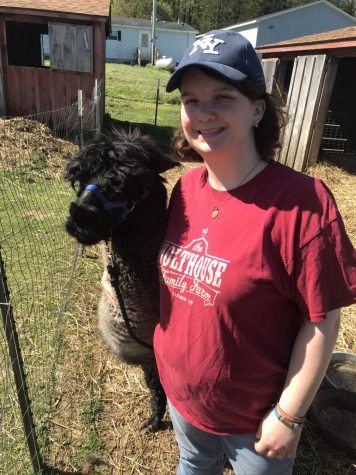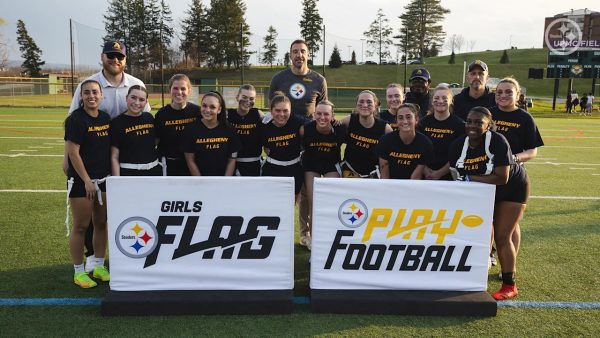Methodist-affiliated schools feel impacts of United Methodist Church decision against inclusion of LGBTQ community
After the United Methodist Church held its General Conference a week ago and decided against allowing members of the LGBTQ community to be included in certain church rites, Methodist affiliated schools and universities are left with a decision to make.
The United Methodist General Conference was held from Feb. 24, 2019, to Feb. 26, 2019, with Feb. 23, 2019, scheduled as a day of prayer. After the three-day conference, a vote was held and passed on Feb. 26, that members of the LGBTQ community will not be allowed to get married in a Methodist Church, have a Methodist pastor preside over their wedding or be allowed to be ordained as a pastor.
Two days after the decision was made, Kristin Dukes, dean for institutional diversity, and Jane Ellen Nickell, college chaplain, sent an email to the campus community detailing what this decision means for Allegheny College, as a United Methodist-affiliated school moving forward.
“Many of us watched with deep disappointment this week as the United Methodist Church approved a plan that excludes gays and lesbians from being ordained or married in the church,” the email read. “While honoring our long connection with Methodism and our shared commitment to social justice, especially in the areas of global health and education, we cannot condone a plan that violates our own Statement of Community and brings harm to LGBTQ persons.”
The email included a statement from the presidents of Methodist affiliated schools calling for the inclusion of all individuals and said students can talk to Dukes or Nickell if they want more information or support.
Nickell attended the conference and explained a good amount of what she witnessed there was hard to portray through news media and had not been included in many reports.
“What I saw at the convention was a lot of passion on all sides of this issue,” Nickell said. “I saw delegates arguing passionately both for and against the Traditional Plan, which ultimately passed.”
The ending vote was to pass or fail the One Church Plan that would have allowed the Methodist Church to remain united on this issue. According to Nickell, when the Plan was defeated by a narrow margin, it became obvious how divided the church is on LGBTQ rights.
“I think the one thing that I saw that a lot of people in the news did not was the resilience and joy of our LGBTQ United Methodists,” Nickell said. “Even though they continue to be shut out of the church, they are determined to stay.”
What ended up being passed in the vote is a complicated subject and violates the United Methodist Church’s constitution, according to Nickell.
“So although it was disappointing to see it be voted in, it is unlikely that it will take effect, and if it does, it will be a much more scaled down version,” Nickell said.
The General Conference is a body of delegates that normally meets once every four years, according to Nickell with the last time they met being in 2016. Though the planned four years was not up, the delegates wanted to meet earlier and discuss LGBTQ inclusion.
Nickell expressed her hope when the next official meeting comes in 2020 delegates will go with a clear plan to separate into two different church bodies in order to create a more inclusive Methodist Church in the United States.
As far as what comes next for the schools and universities connected to the United Methodist Church, Nickell said that how each affiliated school moves forward will depend on each school’s views.
“My hope is that Allegheny and other Methodist-affiliated schools will wait until (the separation) happens and then align with the more inclusive body that comes out of that separation,” Nickell said.
President James Mullen wrote in an email to The Campus how the news of the decision had affected him and what Allegheny plans to do because of it in the future.
“I am deeply saddened by the recent vote of the United Methodist Church to adopt the ‘Traditional Plan,’” Mullen wrote. “The ‘Traditional Plan’ stands in contradiction to Allegheny’s Statement of Community. I am even more saddened because the relationship between Allegheny and the United Methodist Church extends back almost two centuries. As the United Methodist Church comes to a final determination about its future, I will continue to work with the presidents of the more than 118 United Methodist-related colleges and universities, as well as our Board of Trustees and campus community, to evaluate what steps are appropriate for Allegheny.”
Specific details of what it means to be a United Methodist-affiliated school are described in the United Methodist Church affiliated handbook.
A petition was started by Maximus Levinsky, ’21, after the convention to ask Mullen and the board of trustees to consider discontinuing affiliation with the United Methodist Church.
“I have been following this issue closely and started a petition to request that the college disaffiliate from the UMC,” Levinsky said. “…As of right now, we have about 100 signatures from students, faculty and a couple alumni … I’m hoping that the petition will continue to work its way around campus and gain more support.”
Members of the campus community who belong to the LGBTQ community agree with the petition and hope Allegheny will choose to unaffiliate themselves from the United Methodist Church, while the majority of the Church refuses to accept them for who they are.
“As a young queer woman who grew up Methodist, I am incredibly saddened by the decision to follow the Traditional Plan,” Quinn Broussard, ’22, said. “While I no longer affiliate myself with the church, I was always raised to believe that the most important lesson to be found was in Matthew 22:37-39 which states that all that matters is to love God and to love each other. The decision by the United Methodist Church is counterintuitive to these lessons and is one promoting the antithesis of Jesus’ teachings. It’s disheartening to see that something that brought me such comfort during my teenage years has actively decided that they want to affirm their refusal to accept me and all of my friends’ experiences and identities based on mistranslated and misinterpreted verses.”
Broussard said she fully supports the petition started by Levinsky and believes disaffiliation is needed in order to be able to uphold the campus’s statement of community.
Sarah Daniels Roncolato, reverend of Stone United Methodist Church on South Main Street, held a meeting at the end of the regular Sunday service that a few students attended, detailing what the decision means for the church itself, and what the congregation can do moving forward.
“For right now, we don’t have to do anything, we’re going to see how this spring unfolds,” Roncolato said. “The issue that remains is property, and how the property will be split. This body could walk out the door of this church and meet somewhere else, and this church would still be here. This is Methodism, we didn’t just come up with this.”
In April, the Traditional Plan passed at the General Conference will move to the United Methodist Judicial Council where it will be decided whether it is in line with the current constitution. If the Plan is passed again, it will officially take effect. Roncolato explained the decision was made based on the United Methodist Book of Discipline, but the book itself has confusing language that helped create the split.
“(The book) says that we should be against the LGBTQ community getting married or ordained, and even that if a Methodist minister presides over a wedding, they can (be removed) from the church,” Roncolato said. “And yet it also says that all should be accepted and welcome in the church.”
Roncolato explained that until everything is sorted out, her church will continue to meet and hold ministry.
“We’re going to strive as much as possible (to keep our statement) that everyone is welcome here,” Roncolato said.
Nickell said that another part of moving forward is trying to understand the other side and where the resistance comes from.
“In my attempts to understand where their resistance to this comes from, I look back at the resistance to the leadership of African-Americans and women in the Methodist Church,” Nickell said. “Unfortunately, what I saw was that those changes only happened in the case of women after about 75 years. In the case of race it was well over a century. What that tells me is that the people who are entrenched and see this as a threat to the institution that they love are unlikely to change their minds.”
Nickell said she was in favor of a split between the two sides of the argument to be able to create a more open and inclusive Methodist Church, because she believes people who are against inclusion will take a long time to change their minds and that the Church can not wait that long.
“It is interesting, because there are a number of people who have changed their perspective,” Nickell said. “But when people change their mind (it seems) to only go one way. I don’t see many stories about people who have accepted homosexuality and then read the Bible and changed their minds.”
River Branch, associate professor of communication arts, said she has already witnessed much of the damage the United Methodist Church’s decision has caused among members of the LGBTQ community on campus and said she believes if the college continues its affiliation with the United Methodist Church, Allegheny is giving power to the Church’s stance.
“My first response to the decision was mixed,” Branch said. “I went from despair, to hopelessness to a reckoning that the Allegheny community would understand why it is so critical to engage in these issues. I asked myself whether or not (the community) would understand the concrete damage already being absorbed by the LGBTQ community because of this relationship and the increased damage by our continued affiliation in response to this decision.”
Branch described the LGBTQ community as vulnerable with high rates of depression and suicide and lacking support.
“It’s a unique community in the fact that primary systems of support are often severed in the coming out process,” Branch said. “Students need to be able to trust in the community in which they are currently inhabiting.”
Branch enforced her idea that the college should no longer be affiliated with the United Methodist Church. She said though she respects all views and everyone’s right to worship, for the college to remain affiliated would mean giving support to the church’s stance that everyone in the LGBTQ community should not be welcomed in the church and that belonging to that community is a sin.
“This is, in no way, a benign relationship,” Branch said. “There’s no way we can uphold the statement of community and remain affiliated. In order to stand behind our statement there is a tough decision to make. I’ve heard people say we should wait and see. I think that we know what’s right, and what justice is. We need to move from the place where we’re asking people who have been waiting to continue to wait for full rights. We can’t keep asking them to wait for change. As a person raising a child in this community, how do I explain that the college where his mother teaches is affiliated with a place that believes his family is one conceived outside God’s love and wouldn’t allow his mother to get married?”
Branch added that she wanted the Allegheny community to understand the United Methodist Church is “fairly alone among Protestant denominations,” and that she believes Allegheny should take a leadership role and follow some other colleges that are already moving away from the United Methodist Church.
Nickell said that while Allegheny does not agree with the decision made at the convention, overall the connection to the UMC provides certain benefits to those affiliated with the church, including scholarships that students would not be able to receive if they went to other schools.
“The United Methodist Church shares a lot of common values with (Allegheny), specifically on education and global health,” Nickell said. “So I think for students who didn’t know we were Methodist-affiliated, or knew but didn’t know what that meant, it is a good connection for us to have, and we share a lot of common values. I think for those reasons it’s good for us to continue the affiliation while the church sorts this out and hopefully comes to a position that’s more in line with our statement of community. I also want to make sure that any of our LGBTQ students who are feeling especially hurt and alienated by this know that they can come talk to me or (go) anywhere where they feel they can be supported.”

Sara Holthouse is a senior from Panama, NY. This is her third year/final semester on staff, where she has previously served as news editor for the past...









Richard • Mar 8, 2019 at 1:22 pm
There’s no good reason for Allegheny to remain affiliated with an organization that condones this kind of discrimination.